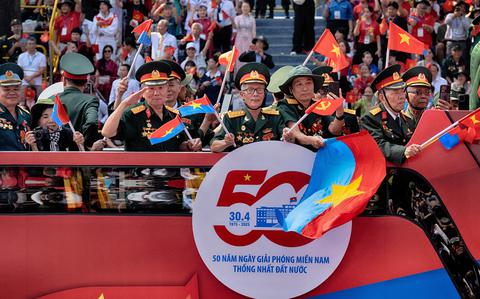When Saigon Fell, My Parents Fled
By Kelli Luu | 30 Apr, 2025
The perilous journeys that saved our families from communism remain firmly entrenched in our Vietnamese American experience a half century later.
This morning Vietnamese communities are remembering a day that changed lives forever. April 30 marks 50 years since the end of two decades of war when North Vietnam captured the South, turning Saigon into what we know today as Ho Chi Minh City.
For those in Ho Chi Minh City April 30 calls for a huge celebration to honor the “reunification” of the country, but for Vietnamese Americans, like myself, we see it as a day of memory and survival.
Born and raised in Los Angeles, I was always surrounded by love and opportunity. It took some growing up for me to comprehend how much my own comfort cost for my parents. Hearing their stories over the years I’ve come to understand that those stories aren’t just theirs — it’s the stories of thousands of Vietnamese parents who went through some of the worst suffering the world has to offer so that my generation could enjoy a better life.
In 1974, just before the South was officially taken over, my grandfather was serving with the Green Berets, the elite U.S. Special Forces unit that focused on training South Vietnamese soldiers. As the North Vietnamese appeared close to overrunning the South’s defenses, my grandparents and their four children were granted priority to evacuate, fleeing with nothing except the clothes on their backs.
In the process of being packed onto a large crowded ship, chaos erupted. My mom, then just six years old, was completely separated from her parents and placed on one vessel with her three younger brothers. Her mother was sent to a second ship and her father to a third. They all lived with the fear that they may never see each other again.
The ships were overcrowded, without enough food and supplies. Many didn’t even have the strength to survive the week long boat journey. At the age of six my mom remembers coming to the realization that she needs to eat to survive, but so did her brothers. When someone handed her a single French baguette — the only food she had seen for days — she broke it into four equal pieces.
During her journey she remembers seeing the stacks of dead bodies growing — memories a child should never have had.
Miraculously all three boats docked in Guam. Families rejoiced to find themselves reunited in the island’s refugee camp. They survived there on donated clothing, food, and hope. It was two months before they were blessed with a sponsorship to go to the sunny state of California and start over.
Equally terrifying was the escape from communism by my father, then 13, and his family in 1976.
“We need to go,” he recalls his father telling his mother.
“Go where?” was the only thought that came to his mind.
With no time to pack the five kids and my grandmother rushed to keep up with my grandfather as he led them to a 20-foot, triple-decker boat that had been built with the savings of many families who shared the same desperate dream.
The boat was boarded by 468 people. Unfortunately, my dad’s family got placed at the bottom where the air was musty. Nearly everyone was seasick.
A couple days into the ordeal, when they thought things couldn’t get worse, somewhere near Thai waters their boat was chased by pirates. Yes, real pirates. Quickly the captain ordered all the men on board up to the top deck to put on a display of numbers and strength. Seeing the boat wouldn’t be an easy target, the pirates ended their pursuit.
My dad’s family docked on an island in Indonesia. No refugee camp awaited. Those who survived the ordeal at sea now faced the task of building shelter with whatever they could scavenge. There was no plumbing, no electricity. To shower required walking all the way up the mountains to a stream.
Without priority status my dad and his family waited a year on the island until a San Francisco church sponsored them and flew them to the United States. There too they would also start over with nothing but each other.
My parents’ stories are just two of the millions that form the heart of the Vietnamese American experience. Whether your parents came by plane, evacuation, or a tightly packed boat, they had to build their lives from the bottom up, after suffering through a war. We first-generation Vietnamese Americans are the living proof of everything our families fought for.
Today Ho Chi Minh City is waving their flag, celebrating unity. Us on the other hand, we will be reflecting quietly, honoring our families’ acts of survival. The end of the Vietnam War was the beginning of a new life for our generation.
It took some growing up for me to comprehend how much my own comfort cost for my parents.

Asian American Success Stories
- The 130 Most Inspiring Asian Americans of All Time
- 12 Most Brilliant Asian Americans
- Greatest Asian American War Heroes
- Asian American Digital Pioneers
- New Asian American Imagemakers
- Asian American Innovators
- The 20 Most Inspiring Asian Sports Stars
- 5 Most Daring Asian Americans
- Surprising Superstars
- TV’s Hottest Asians
- 100 Greatest Asian American Entrepreneurs
- Asian American Wonder Women
- Greatest Asian American Rags-to-Riches Stories
- Notable Asian American Professionals

